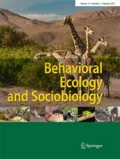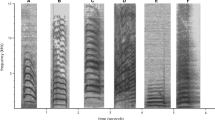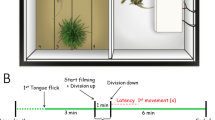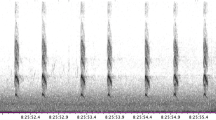Abstract
We sought to understand why a social, desert rodent, the great gerbil, Rhombomys opimus, expends energy and possible risk of predation by footdrumming and vocalizing in the presence of a diversity of terrestrial predators: snakes, monitor lizards, polecats, foxes, and humans. Behavioral observations, human approaches, and experiments with tethered predators revealed that both male and female gerbils called and footdrummed in the presence of offspring, close relatives, and potential mates. Because adults called more often when pups were present, and solitary gerbils seldom gave an alarm, the alarm behavior probably warns conspecifics, especially vulnerable offspring, of potential danger. We also found that gerbils altered alarm behavior with the type of predator. They drummed more in the burrow when a dog that could not enter the burrow was present, and they drummed more out of the burrow in response to a snake that could enter the burrow. Gerbils vocalized and stood in an alert posture in response to all stimuli. The different footdrumming responses of gerbils to terrestrial predators seems related to the hunting style and type of risk posed by the predator, especially its ability to enter the burrow system.
Similar content being viewed by others
Author information
Authors and Affiliations
Additional information
Received: 23 August 1999 / Received in revised form: 6 December 1999 / Accepted: 25 February 2000
Rights and permissions
About this article
Cite this article
Randall, J., Rogovin, K. & Shier, D. Antipredator behavior of a social desert rodent: footdrumming and alarm calling in the great gerbil, Rhombomys opiums . Behav Ecol Sociobiol 48, 110–118 (2000). https://doi.org/10.1007/s002650000199
Issue Date:
DOI: https://doi.org/10.1007/s002650000199




